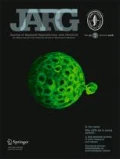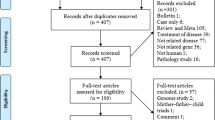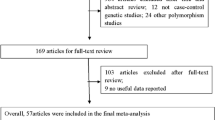Abstract
Objectives
MTHFR C677T and A1298C have been associated with the risk of preeclampsia (PE), but with conflicting results. We performed this meta-analysis to derive a more precise estimation of the association between MTHFR polymorphisms and PE.
Study design
An electronic search of PubMed and Chinese Biomedicine database was conducted to select studies for meta-analysis. 54 case controlled studies containing MTHFR C677T and A1298C gene polymorphisms were chosen, and odds ratio (OR) with confidence interval (CI) was used to assess the strength of this association.
Result
These studies evaluated 7398 cases and 11230 controls for MTHFR C677T. The overall results suggested that MTHFR C677T was associated with the risk of PE. (T vs. C: OR = 1.157, 95 % CI: 1.057-1.266, p=0.002; TT+CT vs. CC: OR=1.165, 95 % CI : 1.049-1.293, P = 0.004; TT vs. CT + CC: OR = 1.371, 95 % CI: 1.153-1.63, p < 0.001). We also evaluated 1103 cases and 988 controls for MTHFR A1298C but could not demonstrate an increased risk of PE for this polymorphism (p=0.667). A symmetric funnel plot, the Egger’s test (p = 0.819) suggested a lack of publication bias.
Conclusion
This meta-analysis supports the idea that MTHFR C677T genotype is associated with increased risk for PE, especially in the case of Asians and Caucasians.


Similar content being viewed by others
References
Report of the National High Blood Pressure Education Program Working Group on High Blood Pressure in Pregnancy. Am J Obstet Gynecol, 2000. 183(1): p. S1-S22.
Duley L. Maternal mortality associated with hypertensive disorders of pregnancy in Africa, Asia, Latin America and the Caribbean. Br J Obstet Gynaecol. 1992;99(7):547–53.
ACOG practice bulletin. Diagnosis and management of preeclampsia and eclampsia. Number 33, January 2002. American College of Obstetricians and Gynecologists. Int J Gynaecol Obstet, 2002. 77(1): p. 67–75.
Kupferminc MJ et al. Increased frequency of genetic thrombophilia in women with complications of pregnancy. N Engl J Med. 1999;340(1):9–13.
Sohda S et al. Methylenetetrahydrofolate reductase polymorphism and pre-eclampsia. J Med Genet. 1997;34(6):525–6.
Grandone E et al. Factor V Leiden, C > T MTHFR polymorphism and genetic susceptibility to preeclampsia. Thromb Haemost. 1997;77(6):1052–4.
Steegers-Theunissen RP et al. Hyperhomocysteinaemia and recurrent spontaneous abortion or abruptio placentae. Lancet. 1992;339(8801):1122–3.
Stamler JS, Slivka A. Biological chemistry of thiols in the vasculature and in vascular-related disease. Nutr Rev. 1996;54(1 Pt 1):1–30.
Rajkovic A, Catalano PM, Malinow MR. Elevated homocyst(e)ine levels with preeclampsia. Obstet Gynecol. 1997;90(2):168–71.
Powers RW et al. Plasma homocysteine concentration is increased in preeclampsia and is associated with evidence of endothelial activation. Am J Obstet Gynecol. 1998;179(6 Pt 1):1605–11.
Chedraui P et al. Polymorphisms of the methylenetetrahydrofolate reductase gene (C677T and A1298C) in nulliparous women complicated with preeclampsia. Gynecol Endocrinol. 2014;30(5):392–6.
Mislanova C et al. Placental markers of folate-related metabolism in preeclampsia. Reproduction. 2011;142(3):467–76.
Lachmeijer AM et al. Mutations in the gene for methylenetetrahydrofolate reductase, homocysteine levels, and vitamin status in women with a history of preeclampsia. Am J Obstet Gynecol. 2001;184(3):394–402.
Egan KM et al. Genetic polymorphisms in GSTM1, GSTP1, and GSTT1 and the risk for breast cancer: results from the Shanghai Breast Cancer Study and meta-analysis. Cancer Epidemiol Biomarkers Prev. 2004;13(2):197–204.
Waterman M et al. Distinct and overlapping genetic loci in Crohn’s disease and ulcerative colitis: correlations with pathogenesis. Inflamm Bowel Dis. 2011;17(9):1936–42.
Dekker GA, Sibai BM. Etiology and pathogenesis of preeclampsia: current concepts. Am J Obstet Gynecol. 1998;179(5):1359–75.
Sun, N.J., Study on the relationship between N5,10-methylenetetrahydrofolate reductase gene and endothelial nitric oxide synthase gene polymorphisms and preeclampsia and eclampsia in the Han nationality women of Guangdong Prog Obstet Gynecol, 2011. 20(3).
Canto P et al. Methylenetetrahydrofolate reductase C677T and glutathione S-transferase P1 A313G are associated with a reduced risk of preeclampsia in Maya-Mestizo women. Hypertens Res. 2008;31(5):1015–9.
Dalmaz CA et al. Relationship between polymorphisms in thrombophilic genes and preeclampsia in a Brazilian population. Blood Cells Mol Dis. 2006;37(2):107–10.
Davalos IP et al. Methylenetetrahydrofolate reductase C677T polymorphism and Factor V Leiden variant in Mexican women with preeclampsia/eclampsia. Blood Cells Mol Dis. 2005;35(1):66–9.
Swanton A et al. IVF outcome in women with PCOS, PCO and normal ovarian morphology. Eur J Obstet Gynecol Reprod Biol. 2010;149(1):68–71.
Prasmusinto D et al. The methylenetetrahydrofolate reductase 677 C–>T polymorphism and preeclampsia in two populations. Obstet Gynecol. 2002;99(6):1085–92.
Kobashi G et al. Absence of association between a common mutation in the methylenetetrahydrofolate reductase gene and preeclampsia in Japanese women. Am J Med Genet. 2000;93(2):122–5.
Sunkara SK et al. The effect of intramural fibroids without uterine cavity involvement on the outcome of IVF treatment: a systematic review and meta-analysis. Hum Reprod. 2010;25(2):418–29.
Kumar S, Mishra VV. Review: toxicants in reproductive fluid and in vitro fertilization (IVF) outcome. Toxicol Ind Health. 2010;26(8):505–11.
Also-Rallo E et al. Polymorphisms of genes involved in homocysteine metabolism in preeclampsia and in uncomplicated pregnancies. Eur J Obstet Gynecol Reprod Biol. 2005;120(1):45–52.
Veleva Z et al. Elective single embryo transfer with cryopreservation improves the outcome and diminishes the costs of IVF/ICSI. Hum Reprod. 2009;24(7):1632–9.
Perin PM et al. Impact of short-term preconceptional exposure to particulate air pollution on treatment outcome in couples undergoing in vitro fertilization and embryo transfer (IVF/ET). J Assist Reprod Genet. 2010;27(7):371–82.
Morrison ER et al. Prothrombotic genotypes are not associated with pre-eclampsia and gestational hypertension: results from a large population-based study and systematic review. Thromb Haemost. 2002;87(5):779–85.
Raijmakers MT et al. Hyperhomocysteinaemia: a risk factor for preeclampsia? Eur J Obstet Gynecol Reprod Biol. 2001;95(2):226–8.
Kim YJ et al. Genetic susceptibility to preeclampsia: roles of cytosineto-thymine substitution at nucleotide 677 of the gene for methylenetetrahydrofolate reductase, 68-base pair insertion at nucleotide 844 of the gene for cystathionine beta-synthase, and factor V Leiden mutation. Am J Obstet Gynecol. 2001;184(6):1211–7.
Mann JS et al. Endogenous gonadotropin flare following microdose leuprolide (MDL) stimulation protocol does not correlate with in vitro fertilization (IVF) outcome. Fertil Steril. 2010;94(6):2427–9.
Rigo Jr J et al. Maternal and neonatal outcome of preeclamptic pregnancies: the potential roles of factor V Leiden mutation and 5,10 methylenetetrahydrofolate reductase. Hypertens Pregnancy. 2000;19(2):163–72.
Check JH et al. A prospective comparison of in vitro fertilization (IVF) outcome following controlled ovarian hyperstimulation (COH) regimens using follitropin alpha exclusively or with the addition of low dose human chorionic gonadotropin (hCG) and ganirelix. Clin Exp Obstet Gynecol. 2009;36(4):217–8.
O’Shaughnessy KM et al. Factor V Leiden and thermolabile methylenetetrahydrofolate reductase gene variants in an East Anglian preeclampsia cohort. Hypertension. 1999;33(6):1338–41.
Pegoraro RJ et al. Methylenetetrahydrofolate reductase gene polymorphisms in black South Africans and the association with preeclampsia. Acta Obstet Gynecol Scand. 2004;83(5):449–54.
Livingston JC et al. Maternal and fetal inherited thrombophilias are not related to the development of severe preeclampsia. Am J Obstet Gynecol. 2001;185(1):153–7.
Farhi J et al. Effect of coasting on IVF cycle characteristics and outcome in short vs. long GnRH agonist protocols. Gynecol Endocrinol. 2010;26(3):187–92.
Dickerson EH et al. Insulin resistance and free androgen index correlate with the outcome of controlled ovarian hyperstimulation in non-PCOS women undergoing IVF. Hum Reprod. 2010;25(2):504–9.
Lauszus FF, Gron PL, Klebe JG. Association of polymorphism of methylene-tetrahydro-folate-reductase with urinary albumin excretion rate in type 1 diabetes mellitus but not with preeclampsia, retinopathy, and preterm delivery. Acta Obstet Gynecol Scand. 2001;80(9):803–6.
de Maat MP et al. Preeclampsia and its interaction with common variants in thrombophilia genes. J Thromb Haemost. 2004;2(9):1588–93.
Mantel N, Haenszel W. Statistical aspects of the analysis of data from retrospective studies of disease. J Natl Cancer Inst. 1959;22(4):719–48.
DerSimonian R, Laird N. Meta-analysis in clinical trials. Control Clin Trials. 1986;7(3):177–88.
Egger M et al. Bias in meta-analysis detected by a simple, graphical test. BMJ. 1997;315(7109):629–34.
Klai S et al. Association of MTHFR A1298C polymorphism (but not of MTHFR C677T) with elevated homocysteine levels and placental vasculopathies. Blood Coagul Fibrinolysis. 2011;22(5):374–8.
Zusterzeel PL et al. Methylenetetrahydrofolate reductase polymorphisms in preeclampsia and the HELLP syndrome. Hypertens Pregnancy. 2000;19(3):299–307.
Myatt L, Miodovnik M. Prediction of preeclampsia. Semin Perinatol. 1999;23(1):45–57.
Lopez-Quesada E, Vilaseca MA, Lailla JM. Plasma total homocysteine in uncomplicated pregnancy and in preeclampsia. Eur J Obstet Gynecol Reprod Biol. 2003;108(1):45–9.
Okohue JE et al. The effect of endometrial thickness on in vitro fertilization (IVF)-embryo transfer/intracytoplasmic sperm injection (ICSI) outcome. Afr J Reprod Health. 2009;13(1):113–21.
Li, M., et al., [Association of the clinical characteristics and the IVF-ET outcome in infertile women with polycystic ovarian syndrome of different subtypes]. Nan Fang Yi Ke Da Xue Xue Bao, 2009. 29(2): p. 224–7.
Wang XM, Wu HY, Qiu XJ. Methylenetetrahydrofolate reductase (MTHFR) gene C677T polymorphism and risk of preeclampsia: an updated meta-analysis based on 51 studies. Arch Med Res. 2013;44(3):159–68.
Xia XP, Chang WW, Cao YX. Meta-analysis of the methylenetetrahydrofolate reductase C677T polymorphism and susceptibility to pre-eclampsia. Hypertens Res. 2012;35(12):1129–34.
Kosmas IP, Tatsioni A, Ioannidis JP. Association of C677T polymorphism in the methylenetetrahydrofolate reductase gene with hypertension in pregnancy and pre-eclampsia: a meta-analysis. J Hypertens. 2004;22(9):1655–62.
Kaiser T, Brennecke SP, Moses EK. C677T methylenetetrahydrofolate reductase polymorphism is not a risk factor for pre-eclampsia/eclampsia among Australian women. Hum Hered. 2001;51(1–2):20–2.
NJ, S., Study on the relationship between N5,10-methylenetetrahydrofolate reductase gene and endothelial nitric oxide synthase gene polymorphisms and preeclampsia and eclampsia in the Han nationality women of Guangdong. Prog Obstet Gynecol, 2011. 20: p. 3.
Coral-Vazquez RM et al. Analysis of polymorphisms and haplotypes in genes associated with vascular tone, hypertension and oxidative stress in Mexican-Mestizo women with severe preeclampsia. Clin Biochem. 2013;46(7–8):627–32.
Teles JS et al. Association of FCRL3 C-169T promoter single-nucleotide polymorphism with idiopathic infertility and infertility-related endometriosis. J Reprod Immunol. 2011;89(2):212–5.
Chavarria ME et al. Maternal plasma cellular fibronectin concentrations in normal and preeclamptic pregnancies: a longitudinal study for early prediction of preeclampsia. Am J Obstet Gynecol. 2002;187(3):595–601.
Powers RW et al. Homocysteine and cellular fibronectin are increased in preeclampsia, not transient hypertension of pregnancy. Hypertens Pregnancy. 2001;20(1):69–77.
Lykke JA et al. Thrombophilias and adverse pregnancy outcomes: results from the Danish National Birth Cohort. J Thromb Haemost. 2012;10(7):1320–5.
Dissanayake VH et al. Candidate gene study of genetic thrombophilic polymorphisms in pre-eclampsia and recurrent pregnancy loss in Sinhalese women. J Obstet Gynaecol Res. 2012;38(9):1168–76.
Aggarwal S et al. Preeclampsia in North Indian women: the contribution of genetic polymorphisms. J Obstet Gynaecol Res. 2011;37(10):1335–41.
Stiefel P et al. Genotype of the CYBA promoter -930A/G, polymorphism C677T of the MTHFR and APOE genotype in patients with hypertensive disorders of pregnancy: an observational study. Med Clin (Barc). 2009;133(17):657–61.
Alfirevic Z et al. Postnatal screening for thrombophilia in women with severe pregnancy complications. Obstet Gynecol. 2001;97(5 Pt 1):753–9.
Muetze S et al. Maternal factor V Leiden mutation is associated with HELLP syndrome in Caucasian women. Acta Obstet Gynecol Scand. 2008;87(6):635–42.
Stonek F et al. Methylenetetrahydrofolate reductase C677T polymorphism and pregnancy complications. Obstet Gynecol. 2007;110(2 Pt 1):363–8.
Nagy B, Hupuczi P, Papp Z. High frequency of methylenetetrahydrofolate reductase 677TT genotype in Hungarian HELLP syndrome patients determined by quantitative real-time PCR. J Hum Hypertens. 2007;21(2):154–8.
Dusse LM et al. Inherited thrombophilias and pre-eclampsia in Brazilian women. Eur J Obstet Gynecol Reprod Biol. 2007;134(1):20–3.
Jaaskelainen E et al. MTHFR C677T polymorphism is not associated with placental abruption or preeclampsia in Finnish women. Hypertens Pregnancy. 2006;25(2):73–80.
Demir SC et al. The relationship between pregnancy induced hypertension and congenital thrombophilia. Saudi Med J. 2006;27(8):1161–6.
Mello G et al. Thrombophilia is significantly associated with severe preeclampsia: results of a large-scale, case-controlled study. Hypertension. 2005;46(6):1270–4.
Driul L et al. Genetic thrombophilias and uterine artery Doppler velocimetry and preeclampsia. Int J Gynaecol Obstet. 2005;88(3):265–70.
Yilmaz H et al. Association of pre-eclampsia with hyperhomocysteinaemia and methylenetetrahydrofolate reductase gene C677T polymorphism in a Turkish population. Aust N Z J Obstet Gynaecol. 2004;44(5):423–7.
Williams MA et al. Methylenetetrahydrofolate reductase 677 C–>T polymorphism and plasma folate in relation to pre-eclampsia risk among Peruvian women. J Matern Fetal Neonatal Med. 2004;15(5):337–44.
Perez-Mutul J et al. A mutation in the 5,10-methylenetetrahydrofolate reductase gene is not associated with preeclampsia in women of southeast Mexico. Arch Med Res. 2004;35(3):231–4.
Fabbro D et al. Association between plasminogen activator inhibitor 1 gene polymorphisms and preeclampsia. Gynecol Obstet Invest. 2003;56(1):17–22.
D’Elia AV et al. Frequency of factor V, prothrombin and methylenetetrahydrofolate reductase gene variants in preeclampsia. Gynecol Obstet Invest. 2002;53(2):84–7.
Watanabe H et al. Evidence for an association of the R485K polymorphism in the coagulation factor V gene with severe preeclampsia from screening 35 polymorphisms in 27 candidate genes. Thromb Haemost. 2001;86(6):1594–5.
Rajkovic A et al. Methylenetetrahydrofolate reductase 677 C –>T polymorphism, plasma folate, vitamin B(12) concentrations, and risk of preeclampsia among black African women from Zimbabwe. Mol Genet Metab. 2000;69(1):33–9.
Li, K., et al., [The common C677T polymorphism in the methylenetetrahydrofolate reductase gene is associated with neural tube defects and preeclampsia]. Zhonghua Yi Xue Yi Chuan Xue Za Zhi, 2000. 17(2): p. 76–8.
Laivuori H et al. 677 C–>T polymorphism of the methylenetetrahydrofolate reductase gene and preeclampsia. Obstet Gynecol. 2000;96(2):277–80.
Kupferminc MJ et al. Severe preeclampsia and high frequency of genetic thrombophilic mutations. Obstet Gynecol. 2000;96(1):45–9.
Kaiser T, Brennecke SP, Moses EK. Methylenetetrahydrofolate reductase polymorphisms are not a risk factor for pre-eclampsia/eclampsia in Australian women. Gynecol Obstet Invest. 2000;50(2):100–2.
Powers RW et al. Methylenetetrahydrofolate reductase polymorphism, folate, and susceptibility to preeclampsia. J Soc Gynecol Investig. 1999;6(2):74–9.
Chikosi AB et al. 5,10 methylenetetrahydrofolate reductase polymorphism in black South African women with pre-eclampsia. Br J Obstet Gynaecol. 1999;106(11):1219–20.
Author information
Authors and Affiliations
Corresponding authors
Additional information
Capsule This meta-analysis showed that MTHFR C677T genotype had increased risk of preeclampsia.
Rights and permissions
About this article
Cite this article
Wu, X., Yang, K., Tang, X. et al. Folate metabolism gene polymorphisms MTHFR C677T and A1298C and risk for preeclampsia: a meta-analysis. J Assist Reprod Genet 32, 797–805 (2015). https://doi.org/10.1007/s10815-014-0408-8
Received:
Accepted:
Published:
Issue Date:
DOI: https://doi.org/10.1007/s10815-014-0408-8




